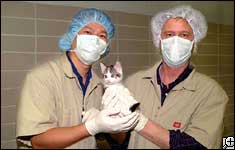|
|||||||||||
|
Washington Post, February 15, 2002 Study Links 8 Hours' Sleep to Shorter Life Span By Shankar Vedantam Contrary to popular belief, people who sleep six to seven hours a night live longer, and those who sleep eight hours or more die younger, according to the largest study ever conducted on the subject. The controversial study, which tracked the sleeping habits of 1.1 million Americans for six years, undermines the advice of many sleep doctors who have long recommended that people get eight or nine hours of sleep every night. "There's an old idea that people should sleep eight hours a night, which has no more scientific basis than the gold at the end of the rainbow," said Daniel Kripke, a professor of psychiatry at the University of California at San Diego who led the study, published in today's Archives of General Psychiatry. "That's an old wives' tale." The study was not designed to answer why sleeping longer may be deleterious or whether people could extend their life spans by sleeping less. But Kripke said it is possible that people who sleep longer tend to suffer from sleep apnea, a condition in which impaired breathing puts stress on the heart and brain. He also speculated that the need for sleep is akin to the need for food, in that getting less than people want may be better for them. The study quickly provoked cautions and criticism, with some sleep experts saying the main problem with America's sleep habits is deprivation, not over-sleeping. "None of this says sleep kills people," said Daniel Buysse, a University of Pittsburgh psychiatrist and the immediate past president of the American Academy of Sleep Medicine. "You should sleep as much as you need to feel awake, alert and attentive the next day. . . . I'm much more concerned about people short-changing themselves on sleep than people sleeping too long." Sleeplessness produces health consequences that were not measured in the study, critics said. "The amount of sleep you get impacts how alert you are, your risk for accidents, how you perform at work and school," said James Walsh, president of the National Sleep Foundation, a nonprofit group that advocates better sleep habits. "There's much more to life than how long you live." The study used data from a massive survey conducted by the American Cancer Society between 1982 and 1988. Women sleeping eight, nine and 10 hours a night had a 13 percent, 23 percent and 41 percent greater risk of dying, respectively, than those who slept seven hours, the study found. Men sleeping eight, nine and 10 hours a night had a 12 percent, 17 percent and 34 percent greater risk of dying within the study period. By contrast, sleeping five hours a night increased the risk of death for women by only 5 percent, and for men by 11 percent. Among people who slept three hours a night, women had a 33 percent increase in death risk and men had a 19 percent increase, compared with those who slept seven hours. Kripke pointed out that relatively few people slept so little -- one in a thousand -- whereas almost half of all people slept eight hours or more. The study also found that taking a sleeping pill every day increases the risk of death by 25 percent. "It appears there is no mortality risk to having insomnia," said Kripke, recommending that people should not routinely take pills to get eight hours of sleep. While acknowledging that the sleeping pills used between 1982 and 1988 were not the same pills being used today, he said, "without data showing that contemporary pills are safe, these data provide the best information about whether sleeping pills are safe for long-term use." Kripke, whose study was funded by federal tax dollars, said doctors' recommendations that everyone get eight hours of sleep a night may have been influenced partly by companies that make sleeping pills. He cited a report from a public relations firm representing the maker of the medicine Ambien, which gave the National Sleep Foundation money to alert people about an insomnia "public health crisis" as part of a marketing campaign. Both Buysse and Walsh have served as paid consultants to sleeping-pill makers, but both denied being influenced by that. Walsh said most researchers in the field have accepted consulting fees from the companies, because "99 percent of the funding to support this type of research is from pharmaceutical companies." Buysse, who wrote an editorial accompanying Kripke's article, said more research is needed to pin down the connection between sleep and the risk of death. The study relied on people's own reports of their sleeping habits, which can be faulty. When people are asked how long they sleep, they usually report how long they spend in bed, Buysse said. That could mean that people who reported sleeping eight hours were really sleeping around 7 1/2 hours, which would bring them into the study's lower-risk category. Buysse also disagreed that sleep is like food, arguing that while people can restrict sleep, they cannot "choose" to sleep longer. "Eating has a much more voluntary component than sleep," he said. "You can choose to eat a Twinkie or a carrot, but I can't choose to sleep 12 hours or six -- I don't have that much voluntary control." Donald Bliwise, a psychologist at Emory University in Atlanta, said studies have shown that when people are allowed to sleep however long they want, without cues from alarm clocks or watches, they often sleep 14 to 15 hours a day for the first few days. "Everyone walks around somewhat sleep deprived," Bliwise said. While agreeing that the risk of dying from reduced sleep is low, he added, "It's hard to know if we shouldn't be worried about five hours of sleep -- if you are talking about being able to drive a truck a thousand miles the next day, being able to concentrate, make important decisions, that's a whole other story."
© 2002 The Washington Post Company
Reuters, february 16, 2002. "Store your favorite pet's DNA," urges the Internet Web site of Genetic Savings and Clone, the company that helped fund the cloning of the first domestic cat. While other groups are working to clone sheep and cattle that produce medicine in their milk, Genetic Savings and Clone has a less ambitious but perhaps more heartwarming goal — helping people breed twins of their beloved pets. Scientists at Texas A&M University said on Thursday they had used a grant from Genetic Savings and Clone to clone a house cat, and presented the result, a 2-month-old kitten they called cc:, short for carbon copy. The Humane Society of the United States objected instantly, saying there are already too many unwanted cats and dogs in the United States. "What is the compelling social purpose behind this experimental practice?" asked Wayne Pacelle, senior vice president of the group. Lou Hawthorne, chief executive officer of Genetic Savings and Clone, says it is not too different from championship breeding. "Cloning is simply the latest form of assisted reproduction, not all that different from artificial insemination and in vitro fertilization — which were also controversial when first introduced," says the company's Web site at http://www.savingsandclone.com. He said millions of homeless cats and dogs destroyed at shelters each year may eventually benefit from the research. "It takes eggs to make clones, hundreds if not thousands of eggs. Where do we get those eggs? From spay clinics. What do we give them in exchange for those eggs? We give them money. They will spay hundreds of times more cats with the money we give them than each single clone we make," Hawthorne said. "We are going to make so few of these animals in the foreseeable future," he added. Genetic Savings and Clone, which also promises to clone endangered animals and livestock, was founded with cash from businessman John Sperling's Apollo Group Inc.
MISSY THE WONDER DOG FIRST PROJECT The first project was called Missyplicity — aimed at making a copy of a much-loved longhaired mongrel called Missy. According to her own Web page at http://www.missyplicity.com, Missy is somewhat of a wonder dog, highly deserving of being reproduced in perpetuity. But it is hard to clone a dog. Duane Kraemer, a cloning expert at Texas A&M, says dog eggs are difficult to get and nurture. "The dog reproductive cycle is much more complex," he added. Once it became clear they could not immediately clone someone's Fluffy, the company turned to gene banking. "This was from people who convinced us that an exceptional animal had just died and their genes needed to be preserved, just like art from a burning building," Hawthorne said. Genetic Savings and Clone was born. "Although we don't have any Missy-clones yet, we believe we're getting very close," the company says. "We've certainly learned a lot, including the best way to store DNA for use in cloning, which is exactly how we'll store your pet's DNA. When cloning becomes feasible and affordable for your pets, their DNA will be safe — even if they're no longer with you." For cat owners, the project is called Copycat. Missyplicity is funded at $3.7 million and Hawthorne estimated it cost "hundreds of thousands of dollars" to produce Copycat and cc:. While the scientific research is currently being done at A&M, the company is building its own labs nearby in College Station. "You can't do pet cloning by trial and error," Hawthorne said. "We have our own research team, our own cloning labs, which are every bit as sophisticated as at A&M. We have a 7,000-square-foot lab and a 2,700-acre ranch off-campus." The company licenses the right to the nuclear transfer cloning technology from Advanced Cell Technology, the Massachusetts company that has cloned cattle and other animals and that is working to clone human embryos for use in medical research. Hawthorne said he hopes his company can come up with species-specific cloning
technology that it can then license itself. |

